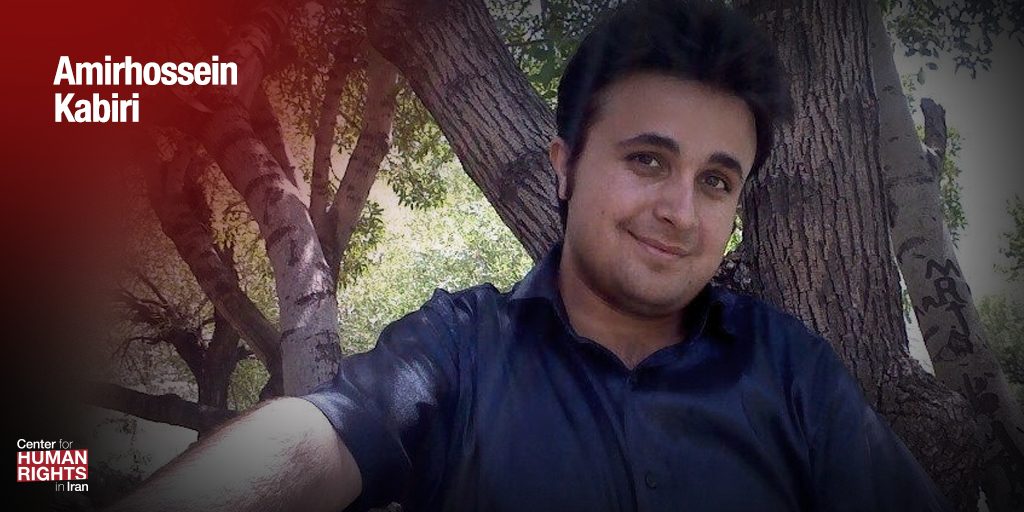“My Brother Was a Passerby… We Want them to Tell Us Why They killed Him”

Family of Bystander Killed During Protests Demands Answers
Reports of the shooting deaths of bystanders not involved in the recent protests in Iran in mid-November continue to grow, indicating the breadth of the indiscriminate firing of live ammunition into crowds of civilians by security forces intent on crushing the protests.
Amirhossein Kabiri, was killed by a bullet, even though he was not a participant in a nearby protest. He was 33 years old. His death certificate states “weapons of war” as the cause of his death on November 19, 2019, in the Golshahr district of Karaj, west of Tehran, his sister informed the Center for Human Rights in Iran (CHRI) on December 9.
“A bullet hit my brother in the back of his neck and exited in the front,” Kamelia Kabiri said. “My brother was supposed to pick up my son from school. But I was contacted by the school and told that my son’s uncle had not shown up. I called his mobile several times but he didn’t answer.”
According to Amnesty International, at least 208 people died during violent state repression of protests that exploded throughout Iran between November 15-December 2 after the government announced a steep gasoline price hike.
Kamelia continued:
Amirhossein had a shop in the Heydarabad neighborhood. He was an English translator as well as a shopkeeper. He had not gone to his shop that day. I made some inquiries near his shop and gave people his description. I was told that he had been shot in the neck and taken to the Alborz Hospital. Before I found my brother, I went to the same area where he had been and saw there was shooting going on. It was so bad that I couldn’t go straight to look for him. I had to go through alleyways.
There is a police station there on the corner of 45-Meter St. in Golshahr. I went there and knocked on the door but they didn’t let me in. A soldier told me I should go to the intelligence office in the Mahestan district and give them information about my brother with photos to do an investigation. He said the matter was not their concern. But I had seen with my own eyes bullets being fired from there. He said, ‘we’re not allowed to fire bullets [at people]. Bullets were fired into the air.’
Then I went to the Alborz Hospital. My brother’s neck had been dislocated from his spine. He was in a coma at the time. On the first day, the authorities at the hospital were very strict and we didn’t know anyone who could let us inside. On the second day, nobody stopped us but I could see the families of people who had been shot, coming and going with security agents next to them. Perhaps they didn’t bother us because they had seen a film of my brother being shot innocently. I don’t know.
Referring to a video clip on social media showing a man on the pavement with both hands in his jacket pockets, Kamelia told CHRI: “That video is of my brother. He was not in the protests. He was not taking sides. Perhaps he was among the spectators. His shop and home were in that same area and maybe he was standing there watching the unrest but he was not part of it. He was standing there with his hands in his pockets, not worrying about being shot.”
Kamelia added: “The authorities didn’t ask for any money to deliver his body but they made my father sign a pledge not to say a word, print flyers or hold a ceremony for him at the mosque. My father obliged because he wanted to take the body. We buried my brother in silence and solitude in the Beheshte Sakineh Cemetery in Karaj and held a memorial for him at our house.”
“In the death certificate that was given to us it says the cause of death was the ‘firing of a weapon of war in a non-war situation’ and it explained that he had been struck with a ‘war bullet.’ The medical examiner said the approximate type of weapon would be determined in a month and a half. They said it was not easy to make a firm determination because the bullet had not remained in the body after striking the neck.”
Mohammad’s sister continued: “My parents will file a complaint. I read in the news that they want to pay blood money to comfort the families but the truth is that paying blood money and declaring martyrdom do not matter. We want them to tell us who killed my brother. We want them to punish him. My brother was a passerby, or a spectator at most. We want them to tell us why they killed him.”
In a statement on December 8, 2019, the EU’s High Representative for Foreign Affairs Josep Borrell Fontelles condemned the Iranian government’s “disproportionate use of force against non-violent protesters” and UN High Commissioner for Human Rights Michelle Bachelet issued a statement on December 6 stating that the violent state response to the protests in Iran represented “clear violations of international norms and standards on the use of force.”
Read this article in Persian.






